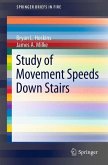This book presents an overview of modeling definitions and concepts, theory on human behavior and human performance data, available tools and simulation approaches, model development, and application and validation methods. It considers the data and research efforts needed to develop and incorporate functions for the different parameters into comprehensive escape and evacuation simulations, with a number of examples illustrating different aspects and approaches. After an overview of basic modeling approaches, the book discusses benefits and challenges of current techniques. The representation of evacuees is a central issue, including human behavior and the proper implementation of representational tools. Key topics include the nature and importance of the different parameters involved in ASET and RSET and the interactions between them. A review of the current literature on verification and validation methods is provided, with a set of recommended verification tests and examples of validation tests. The book concludes with future challenges: new scenarios and factors for future model developments, addresses the problem of using deterministic and/or stochastic approaches and proposes, and discusses the use of evacuation models for supporting timely decisions in real-time. Written by international experts, Evacuation Modeling Trends is designed for those involved in safety, from emergency and intervention personnel to students, engineers and researchers.
Bitte wählen Sie Ihr Anliegen aus.
Rechnungen
Retourenschein anfordern
Bestellstatus
Storno








